To say the COVID-19 pandemic presented challenges to the UW–Madison campus community — and the world — would be an understatement.
Most everything is different than it was at the start of March 2020, when it became evident that the coronavirus would force significant changes in the United States, as it already had in other parts of the world. And several months later, people continue to grapple with issues related to the pandemic that test their physical and mental health, determination, and creativity.
Following are some examples of how faculty, staff, and students across the School of Education responded to the coronavirus and made the most of a challenging situation during a remarkable 2020 spring semester.
• The COVID-19 pandemic, especially during its early stages, had people fearful and confused. The situation was constantly and quickly evolving. Images of healthcare workers in protective gear and news about the number of people infected and who had died were constant reminders that things had changed for the foreseeable future.

It’s stressful enough when you’re a grown-up. But for kids, it can be especially scary.
What do we tell children in times of uncertainty? There are no easy answers, but Travis Wright, an associate professor with the Department of Counseling Psychology in the School of Education, offered some suggestions.
“Trauma shifts our view of the world, making it seem like a dangerous place where fear and harm might be expected,” Wright said in March. “As a result, children who have experienced trauma are prone to worry and often assume the worst.”
Wright is a nationally recognized expert on resilience and emotionally responsive teaching, especially for children developing in the midst of adversity.
To learn what Wright had to say about talking to kids about COVID-19, check out this report from University Communications.
• Every academic year, the School of Education’s Art Department hosts over 60 exhibitions, including that of its master of fine arts (MFA) students.

With the COVID-19 pandemic forcing the closure of physical spaces on the UW–Madison campus, third-year MFA student exhibitions were moved online.
Though students were challenged to create without many resources, the Art Department reports that many were finding innovation and positivity out of this experience as they explore unknown territory.
As one example, Maryam Ladoni — a photo-based artist who grew up in Iran and came to UW–Madison to pursue a master of fine arts — worked hard to get her MFA show posted online. On April 8, she shared a powerful video she produced that showcased her journey to UW–Madison and the staged photography work that led to her MFA exhibition, “Cheltikeh.” (Learn more in this report).
To view all of the 2020 virtual MFA exhibitions, visit this Art Department web page.
• A team of early math education experts from across the country pooled its expertise to develop a set of free, research-based learn-at-home materials geared toward children from birth to age 8.
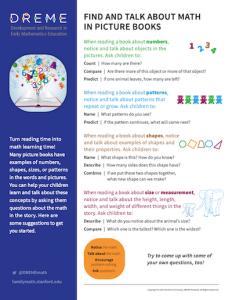
The “At-Home Early Math Learning Kit for Families,” created by the DREME Network’s Family Math team, is especially valuable as many continue to learn from home. The goal is to give families ideas that are fun, easy to implement, require no special materials, and can be folded into daily life — rather than feel like an extra task.
The DREME, or Development and Research in Early Math Education, Network was created in 2014 to advance the field of early mathematics research and improve young children’s opportunities to develop math skills. It includes a dozen scholars from across the country, including UW–Madison’s Amy Claessens, an associate professor with the Department of Educational Policy Studies and the Gulbrandsen Distinguished Chair in Early Childhood Education.
The quick-start kit of free early math resources is available for download in both English and Spanish.
“We focused on creating simple activities that do not require a lot of materials so that math could be incorporated into daily life easily,” says Claessens, who is the associate director of UW–Madison’s Center for Research on Early Childhood Education (CRECE). “Parents are under a lot of pressure with young children home from school and childcare, and we wanted to make math an easy and fun part of their days.”
Learn more about these efforts in this report.
• Matt Hora, who heads the Center for Research on College-Workforce Transitions (CCWT), received a new rapid-response grant from the National Science Foundation in May to analyze how online internships are influencing academic and career outcomes for a growing number of students during the COVID-19 pandemic.

The $145,000 award is funding a six-month, mixed-methods study examining college student experiences with online internships in two high-profile ways: through a look at ‘micro-internships,’ a popular sub-specialty of web-based internships that are very short-term, focused on one task, and brokered by a third-party vendor; and by studying if and how companies in competitive science, technology, engineering and math (STEM) fields are shifting their internships to online versions.
CCWT is housed within the School of Education’s Wisconsin Center for Education Research. Hora is an assistant professor of adult and higher education in the Departments of Educational Policy Studies and Liberal Arts & Applied Studies. Learn more about his rapid-response grant work in this report.
Hora and his CCWT team also produced a new resource guide for colleges, students, and employers that points the way to a host of web-based alternatives to the traditional college internship.
• Li Chiao-Ping, a Vilas Research Professor with the School of Education’s Dance Department, shared her thoughts about transitioning the in-person classes she taught during the spring semester to alternate delivery modes.
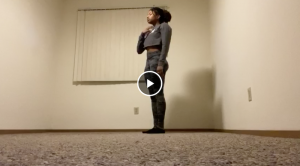
She led two advanced-level, studio dance courses. And while there were plenty of proverbial bumps in the road, after overcoming an initial fear factor — “I had never taught online, so this was horrifying at first,” Li said — she remained upbeat about how the spring semester unfolded.
“The quality of the work our students are producing is very high — and in some ways even better than before,” said Li. “Despite all of the challenges, they are rising to a new level and it’s making them be more creative and think through assignments more deeply.”
To learn more, and to view several videos of student work that was produced from home during the pandemic, check out this report.
• WIDA Early Years in March released a new booklet — “Learning Language Every Day: Activities for Families” — that’s available free online in English and Spanish to help children keep learning at home during the COVID-19 pandemic.
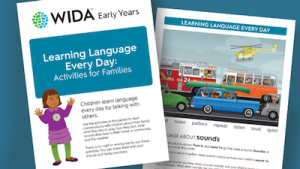 The booklet can be downloaded for printing and sharing. Appropriate for children between the ages of 2 and 7, the activities in the booklet encourage kids to practice and improve their language skills by talking about topics they know — themselves, their families, what they like to play, how they feel, what sounds they hear, and the weather.
The booklet can be downloaded for printing and sharing. Appropriate for children between the ages of 2 and 7, the activities in the booklet encourage kids to practice and improve their language skills by talking about topics they know — themselves, their families, what they like to play, how they feel, what sounds they hear, and the weather.
“Children learn language by listening to those around them and then using their language skills to respond,” says Lorena Mancilla, director of WIDA Early Years, a resource that advances multilingual learning for young children in early-care and education settings. WIDA is housed within the UW—Madison School of Education’s Wisconsin Center for Education Research.
“Parents were not given much time to prepare for their children to learn at home and they should not be expected to teach academic subjects for six hours a day,” says Mancilla. She wants families to know that they can choose from a variety of ways to keep their children engaged and support learning at home.
Learn more about these at-home language activity booklets via this article.
• In April, Madison’s local CBS affiliate, WISC-TV/Ch. 3, put the spotlight on the School of Education’s Whoopensocker program and its efforts to start connecting with people online.

Erica Halverson, who developed Whoopensocker as part of the UW Community Arts Collaboratory in the Office of Professional Learning and Community Education (PLACE), explains to WISC-TV’s Michael Bruno how the program has traditionally featured in-person, arts-based, community-building experiences.
Since its launch in 2015, Whoopensocker’s ensemble of teaching artists had come into elementary school classrooms and community centers in the Madison area for six-week sessions — meeting once a week for 90 minutes. Together, the students and teaching artists would explore different aspects of dramatic structure and creative writing, and similarly learn improvisation games and act out stories.
One of the program’s highlights would come about two weeks after the last classroom session, when Whoopensocker’s professional actors would turn students’ creative works into vaudeville-style plays or musical numbers, which were then performed for the whole school.
Due to the COVID-19 pandemic, the in-person meetings and public shows are currently not possible.
But the show must go on.
Halverson, a professor with the Department of Curriculum and Instruction, tells Bruno how Whoopensocker transitioned its successful, in-person efforts to online interaction. For the latest videos from Whoopensocker, check out the group’s YouTube channel or Facebook page, or look for updates on the Arts Collaboratory website.
• As the COVID-19 pandemic shuts down schools across the nation, many parents were concerned about keeping their children active without the help of physical education (PE) classes.
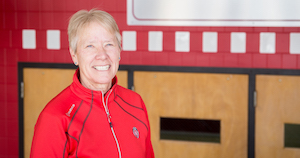
But Cindy Kuhrasch, who oversees the School of Education’s Physical Education Teacher Education program, viewed these new circumstances as an opportunity to showcase the full potential that PE can have in children’s lives.
The good news, said Kuhrasch, is it doesn’t take much for parents to devise engaging and holistic activities for their children while stuck at home.
To help parents come up with ideas, Kuhrasch, her colleagues, and students were updating the Physical Education Teacher Education program’s Facebook page regularly to provide free resources and inspiration for staying active at home.
To learn more about these efforts, check out this blog post.
• UW–Madison’s Mitchell Nathan and Martha Alibali in May took part in a virtual panel discussion hosted by the Embodied Mathematical Imagination & Cognition (EMIC) team. The 90-minute event — titled “Instructional Gestures for Classrooms and On-Line Mathematics Learning” — was recorded and can be accessed via this EMIC web page.

These efforts are especially important as more and more young people and teachers are utilizing online instruction.
The panel focused its efforts on examining these questions: why is gesture important for learning and teaching?; what can gesture research tell us about how to make online learning effective?; what can we expect to be challenges for online learning?; and what advice for parents do you all have right now — and for teachers facing online instruction?
Nathan is a Vilas Distinguished Achievement Professor of the learning sciences and a faculty member with the School of Education’s Departments of Educational Psychology and Curriculum and Instruction. Alibali is a Vilas Distinguished Achievement Professor with the Department of Psychology and is an affiliate of the Department of Educational Psychology.
• And this summer, The Discussion Project launched a new virtual program that started the week of July 20. The Discussion Project Virtual is an online training that supports UW–Madison instructors in creating the conditions for equitable, inclusive, and engaging online discussions.
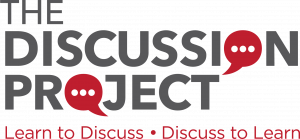 This new training is designed to support UW–Madison instructors in their important work to improve online discussion.
This new training is designed to support UW–Madison instructors in their important work to improve online discussion.
The Discussion Project is funded by the Andrew W. Mellon Foundation and operates within the Wisconsin Center for Education Research, which is housed within UW–Madison’s School of Education. School of Education Dean Diana Hess is the project’s principal investigator.
The training consists of five, two-hour synchronous sessions in BBCollaborate Ultra, each accompanied by an hour of asynchronous work. For completing all sessions, modules, and program evaluation surveys, participants will receive $250. All participants will also have access to free instructional consultation during or after the training. Any UW–Madison instructor of a fully online course this fall may take the training, including graduate students who are the primary instructor for their course.